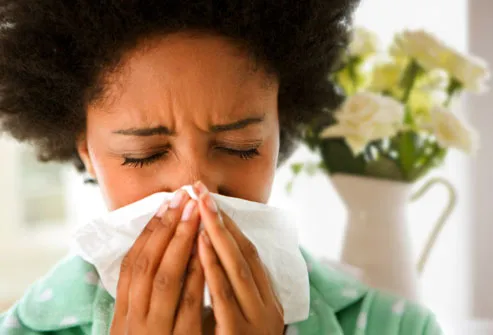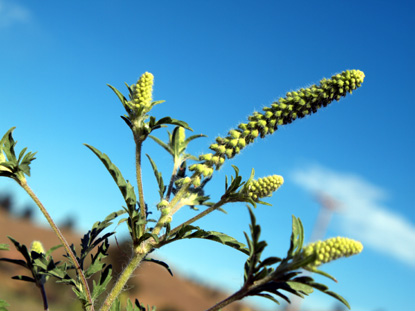Check out this link from the ACAAI to learn more about the pros and cons of the new grass allergy tablet:
http://www.acaai.org/allergist/news/New/Pages/AllergyTabletApprovalWarrantsCautionfor_Some.aspx

Welcome to the South Bay Allergy & Asthma Blog where you will find tips and advice from board certified Allergy and Immunology doctors and nurses on dealing with nasal, seasonal, insect, medication, food and skin allergies. Also visit our blog to stay current on news and advances in care and treatment of allergy, asthma and immunology, including developments in the world of immunotherapy: allergy shots, drops and tablets.
Showing posts with label pollen. Show all posts
Showing posts with label pollen. Show all posts
Thursday, April 3, 2014
Wednesday, July 3, 2013
Grass allergies don't have to limit world-class sports
While tennis champion Sabine Lisicki talks about managing her grass allergies with medications, playing a sport on grass can often be managed even more effectively through desensitization to grass by allergen immunotherapy, or "allergy shots". Bottom line: no need to give up your favorite sport just because grass exposure is involved. Call if you need some help with managing your allergies so that you can focus on your game!
Tuesday, October 16, 2012
"Why are my allergy symptoms worse than ever before?"

The answer may be due to the "priming effect".
The "priming effect" is an increased sensitivity of the lining of the nose that occurs with repeated exposure to allergens like pollen.
With the hot weather occurring earlier in the year this year and sticking around longer than usual, there has been more pollen in the air (plants produce more pollen in hotter weather).
This has meant a longer allergy
season and a therefore a more vigorous "priming effect" that has become stronger
and stronger as the different seasons have progressed.
So a person doesn't need to be exposed to as much pollen to have symptoms of hay fever (also known as seasonal allergic rhinitis). These symptoms include sneezing, runny nose, nasal congestion, scratchy throat, watery/itchy eyes and even fatigue. All of these can greatly affect quality of life and can lead to complications like sinus infections and asthma flares.
People who've never had seasonal allergic rhinitis symptoms before may experience them for the first time. Others who could control these symptoms with over the counter medications like antihistamines now need additional medication to help symptoms.
We are currently in the fall allergy
season where weeds and molds are the main culprits that cause symptoms. Elm tree pollen is also important here
in So Cal this time of year. The "priming effect" can also cause patients to be more sensitive to other allergens like dust mites and animal dander.
The most important thing for patients to know is: don't ignore your symptoms! If allergen avoidance and over the counter medications are not enough, go see an allergist to discuss other options and to develop a treatment plan that is right for you!
For more information, please visit: www.southbayallergy.com
Labels:
allergy,
animals,
asthma,
asthma triggers,
dog,
dust mites,
environment,
FAQ,
medication,
nasal congestion,
pets,
pollen,
ragweed,
seasonal allergies,
sinusitis,
weather
Monday, October 1, 2012
Cold or Allergy?

Take this quiz to learn more!
For more information, please visit us at www.southbayallergy.com
Source: WebMD
Thursday, September 27, 2012
Oral Allergy Syndrome
If you also happen to be allergic to ragweed pollen, you may be experiencing a type of allergy called "oral allergy syndrome". This occurs when eating fruits or vegetables containing proteins that are cousins of pollen proteins, especially during that specific pollen season. So eating melons during the early fall, when ragweed pollens are high, can result in itching or tingling of the lips or mouth. People with birch pollen allergy may react in this way when eating apples.
Are these symptoms dangerous?
Unlike peanut or shellfish proteins, which often cause serious allergic reactions, these fruit proteins are rapidly broken down by enzymes in your mouth or stomach, making it very unlikely that they will make it into your bloodstream to cause a severe reaction.
As with all allergy symptoms, however, it is advisable to have any adverse reactions to a food checked out by an allergist for specific recommendations.
For more information, visit our website at www.southbayallergy.com.
Thursday, September 20, 2012
Fall Allergy Tips!
 Look out for ragweed and mold! They are 2 of the main culprits that can cause allergy symptoms in the Fall.
Look out for ragweed and mold! They are 2 of the main culprits that can cause allergy symptoms in the Fall.Ragweed and other weeds are the biggest allergy triggers in the Fall. They begin pollinating in August and can travel hundreds of miles in the wind.
Mold thrives in damp areas such as in the piles of damp leaves lining yards and streets, bathrooms, and damp basements.
Here are some tips to manage your Fall allergies:- Limit your time outdoors when pollen counts are high and close your windows during windy days to keep pollen from blowing in. (check daily pollen counts in your zip code on our website: www.southbayallergy.com)
- Use your HEPA (high efficiency particulate air) filter, which removes at least 99% of pollen, as well as animal dander, dust and other particles.
- Wear a mask when raking leaves to avoid inhaling mold spores.
- Before turning on the heater for the first time, clean the heating ducts and change the filters because mold and dust particles can become trapped in the vents over summer.
If you have symptoms like sneezing, runny or stuffy nose, or itchy eyes or throat, you should see an allergist to discuss treatment options like prescription medications or allergy shots.
For more information, please visit our website at www.southbayallergy.com
For more information, please visit our website at www.southbayallergy.com
Source: ACAAI
Wednesday, September 5, 2012
An allergy app for drivers!!
Ford greenlights first health app: Allergy Alert! Read the full article here.
Wednesday, November 23, 2011
Allergy Alert!
The rain has kept the pollen levels low. However, mold spores are still prevalent. In addition, the Santa Ana winds will be picking up this weekend which can cause allergy flare ups. Please close your windows and take allergy medications if you are pollen allergic.
Monday, October 3, 2011
5 facts about Ragweed

Fast Facts about fall's nastiest weed.
1. There are dozens of varieties of ragweed, but common and giant ragweed are the biggest culprits.
2. Ragweed pollen can travel; it has been measured in the air 400 miles out to sea and two miles up in the atmosphere.
3. A ragweed plant lives only one season, but produces up to 1 billion pollen grains.
4. People with ragweed allergy may also get symptoms when they eat cantaloupe and banana. That's an allergic cross-reaction.
5. Some people relocate to get away from ragweed, and while that often helps for a few years, it's common to develop allergies to plants in the new location within a few years.
Source: Asthma & Allergy Foundation of America
Monday, August 8, 2011
I'm allergic to pollens, what can I do?

1. Avoid contamination of your bedroom with outdoor pollens; this prevents constant exposure to pollens all night long, which may be even more important than acute exposure to outdoor pollens when outside for 1-2 hours at a time.
- Leave outdoor play or work equipment outside or in a separate area of your home - never bring shoes, tennis rackets, soccer clothes, golf clubs, etc into the bedroom. Find another place to store these items.
- Remove outdoor play or work clothes ideally before entering the bedroom. Change clothes in a bathroom or other room where clean clothes are kept, and put pollen-contaminated clothing in the laundry immediately. Hampers can hold the clothes till wash day provided this is not in the bedroom.
- Never throw contaminated clothing (clothes worn outdoors to play or work in yard) onto the bed, or sit/lie on the bed with these clothes on. This would contaminate the bed, with resultant prolonged exposure to the pollens all night long.
- Bathe or shower before bed, after being outdoors, especially if out in the wind or gardening, rolling or sitting on the grass, etc.
- Wash linens in hot water once a week to remove excess pollen that may have made its way into the room.
- Avoid opening windows during peak pollen seasons; or during peak pollen times of the day: pollen counts rise first thing in the morning when the sun comes up, and again in mid-afternoon when the wind is blowing.
- This is the only type of air filter/purifier which has been proven to eliminate pollen sized grains (very small, microns in diameter); we do not recommend non-HEPA systems such as ionizers and inexpensive small non-HEPA filters, due to lack of proof of efficacy in allergen removal.
- Run the unit on "HIGH" for 2-3 hours before bedtime, in the bedroom with doors and windows closed. This should clear out the majority of airborne particulates including pollen grains before you go in to sleep.
- Then it may either be turned to "LOW" for the night, or turned off at night; depends on severity of allergies, and whether there are symptoms upon turning it off.
- Charcoal prefilters need to be replaced every 6-12 months, depending on use, and the actual HEPA filter should be replaced about every 3-5 years.
4. Contact lens wearers: frequently use lubricant or "rewetting" eyedrops to remove pollen and irritants which may be "stuck" to the lens causing additional eye symptoms. Soft lenses especially can "hold" pollen and irritants in your eyes, enhancing exposure during heavy pollen seasons. Clean lenses frequently during heavy pollen seasons.
Subscribe to:
Posts (Atom)
